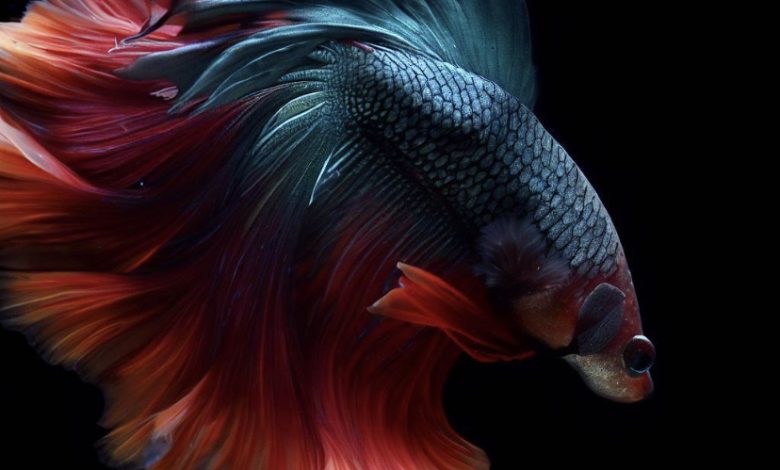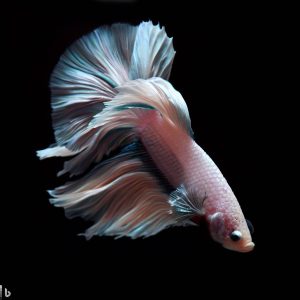Why is my betta Fish Not Eating: Common Causes and Solutions

It can be quite worrisome when your beloved betta fish refuses to chow down on their favorite meals. When your finned friend loses their appetite, it might be an indication of an underlying issue that needs attention. But fear not! In this article, we’ll dive into the common reasons why your betta fish may not be eating and provide some practical solutions to help resolve the problem. So, let’s splash into action and troubleshoot this situation to ensure the well-being of your betta companion.
Why is my betta Fish Not Eating
There can be several reasons why a betta fish may not be eaten. Some common reasons include stress, illness, water quality issues, or feeding preferences.

Possible Health Issues
Our finned friends can sometimes suffer from health problems that impact their appetite. Keep an eye out for any unusual behavior like odd swimming patterns, discoloration, bloating, or deterioration of their fins. These might be signs of bacterial or fungal infections, parasites, or internal issues.
If you suspect a health problem, it’s wise to consult a qualified veterinarian experienced in fish care. They’ll be able to diagnose any underlying conditions and provide appropriate treatment to get your betta back on track to being a hungry little fishy.
Water Quality and Tank Conditions
The quality of the water – is a vital factor in your betta’s happiness and appetite. Poor water conditions can leave your betta fish stressed out and uninterested in their meals. To keep things swimmingly clean, make sure to regularly monitor the temperature, pH levels, ammonia, and nitrite levels in your tank using reliable testing kits.
Implement a proper filtration system and perform regular water changes to maintain a clean and healthy environment for your betta. A pristine tank equals a happy betta and a better chance of them gobbling up their food with gusto.
Also Read: Are Fish Reptiles? Similarities and Differences
Incompatible Tank Mates and Aggression
Now, bettas have quite the reputation for being territorial little fellows. Sharing a tank with incompatible tank mates can send their stress levels skyrocketing, which, you guessed it, can lead to a loss of appetite.
Keep an eye out for any signs of aggression from other fish in the tank, like nipping at your betta’s fins or hogging all the grub. If you suspect your betta is caught up in some underwater drama, consider separating them from their tank mates or rearranging the tank to create separate territories.
By providing hiding spots and visual barriers, you can help promote a peaceful feeding environment for your betta to enjoy their meals in peace.
Also Read: How Do Fish Have Sex
Feeding Habits and Preferences
These little fishies can be quite picky eaters. To keep their taste buds happy, try experimenting with different types of food. Betta-specific pellets, flakes, freeze–dried or frozen treats, and even live food can all be on the menu.
Pay attention to what gets their fins wiggling with excitement. Also, consider feeding them smaller portions multiple times a day instead of one big meal.
It’s like offering them a buffet throughout the day, ensuring they don’t miss out on a delicious bite. Remember, each betta has their own culinary preferences, so cater to their needs to get those taste buds dancing.
Stress and Environmental Factors
Just like us, bettas can get stressed out by their surroundings. Sudden loud noises, excessive light exposure, or not enough hiding places can turn our little fishy friends into worrywarts.
Creating a peaceful environment is key! Make sure your tank is well-decorated with plants and caves, and provide some gentle lighting.
Minimize disturbances and maintain a consistent routine to help reduce stress levels. A serene and predictable environment will encourage your betta to unwind, feel safe, and enjoy their meals without any distractions.
Aging and Declining Appetite
As our bettas gracefully swim through the years, they may experience a natural decline in their appetite. Just like humans, age catches up to our little buddies too.
So, it’s important to adapt their care as they enter their golden years. Consider providing softer or more easily digestible food options to accommodate their changing needs.
Also, ensure the water temperature remains within their comfort range, as cooler temperatures can dampen their appetite. Keep a close eye on their behavior and consult a fish expert or veterinarian for guidance on caring for our seniors in the tank.
Overfeeding or Underfeeding
Feeding them too much or too little can throw their appetite off track. Overfeeding can lead to bloating and digestive problems, while underfeeding can leave them feeling like they’re stranded in a seafood desert.
The key is finding the perfect portion size. Feed them an amount they can gobble up within a few minutes. Adjust the quantity based on their size, activity level, and individual needs. It’s all about keeping their bellies satisfied without going overboard or leaving them wanting more.
Food Variety and Nutritional Balance
Variety is the spice of life, even for our betta friends! They need a diverse diet to meet their nutritional needs and keep their taste buds tickled.
Rotate between high-quality betta-specific pellets, flakes, and the occasional treats to give them a well-rounded menu. Spice things up with small portions of live or frozen foods like bloodworms or brine shrimp to provide essential nutrients.
Remember, don’t rely solely on one type of food. Keep their diet interesting and nutritious to keep their appetite buzzing.
Behavioral Changes and Seasonal Patterns
Sometimes, our betta buddies go through some behavioral changes that affect their eating patterns. It could be due to natural factors like breeding or seasonal cycles. During breeding, male bettas often lose interest in food as they focus on building nests and wooing potential partners.
Similarly, seasonal transitions can impact their appetite. As long as they remain active and healthy, temporary changes in appetite should not cause you to flip your fins in worry. Just keep a watchful eye and let nature take its course.
Troubleshooting and Solutions
If you’ve exhausted all the fish-friendly possibilities and your betta fish is still being a picky eater, it’s time to call in the experts. Reach out to a qualified veterinarian with experience in fish care or tap into knowledgeable fishkeeping communities for guidance.
Each betta fish is unique, and an expert can evaluate your specific situation and provide tailored solutions to get your little fishy back on the path to a healthy appetite.
How long can a betta fish go without eating?
Betta fish can go without eating for several days to a couple of weeks, depending on their overall health and condition. However, it’s not recommended to intentionally starve a betta fish or deprive it of food for extended periods.
How do you force-feed a betta fish?
Force-feeding a betta fish should be considered a last resort and should only be done under the guidance of a veterinarian or a fish expert.
Force-feeding can be stressful for the fish and may cause further harm if not done properly. If you believe your betta fish requires force-feeding, it is crucial to seek professional advice to ensure the well-being of the fish.
Steps involved in force-feeding a betta fish
1. Prepare a suitable food mixture: Your veterinarian or fish expert will guide you on the appropriate food mixture for force-feeding. It may involve blending or liquefying the food to a consistency that can be easily administered.
2. Use a feeding tool: A syringe or a small tube can be used as a feeding tool. Make sure it is clean and free of any contaminants. Soften the tip of the tool by soaking it in warm water to minimize potential injury to the fish.
3. Restrain the fish: Gently and carefully hold the betta fish with one hand, making sure not to apply excessive pressure. You can hold it near the base of the pectoral fins to provide stability.
4. Administer the food: Slowly introduce the food mixture into the fish’s mouth, aiming towards the back of the throat. Be cautious not to force too much food or overwhelm the fish. Allow the fish time to swallow between each administration.
5. Observe the fish: Monitor the fish closely during and after the force-feeding process. Look for signs of distress or choking. If the fish shows any signs of further discomfort, stop the process immediately and consult a professional.
Remember, force-feeding should only be undertaken as a last resort and under professional guidance. It’s crucial to address the underlying issues causing the fish’s lack of appetite and work towards creating a suitable and stress-free environment for the betta fish’s well-being.
Why is my betta fish spitting out his food?
There can be several reasons why a betta fish might spit out its food. Here are some possible explanations:
1. Food Size: Betta fish have small mouths, and if the food pellets or flakes you are feeding them are too large, they may have difficulty swallowing them. In such cases, the fish may spit out the food.
2. Food Type: Betta fish are carnivorous and primarily eat insect larvae in the wild. If you are feeding them a different type of food, such as flakes or pellets, they may not find it as appealing. It’s possible that the fish is spitting out the food because it doesn’t like the taste or texture.
3. Overfeeding: If you are giving your betta fish too much food, it may spit out the excess. Overfeeding can lead to digestive issues and other health problems in bettas, so it’s important to feed them an appropriate amount.
4. Illness or Dental Issues: Sometimes, betta fish may have underlying health issues that make it difficult for them to eat or swallow their food properly. Dental problems or infections in the mouth can cause discomfort and lead to spitting out food.
Conclusion
Alright, fellow fish aficionados, now you’re armed with some fin-tastic knowledge on why your betta fish might be playing hard to eat. By considering factors like health issues, water quality, tank conditions, feeding habits, and the ever-elusive world of betta preferences, you’re well-equipped to troubleshoot and solve the mystery of the vanishing appetite.
Remember, a happy and well-fed betta is a sight to behold, so let’s dive in, make the necessary adjustments, and ensure our betta friends have their taste buds tantalized with delicious meals once again. Happy betta-feeding adventures, everyone!





I do not even know how I ended up here but I thought this post was great I dont know who you are but definitely youre going to a famous blogger if you arent already Cheers